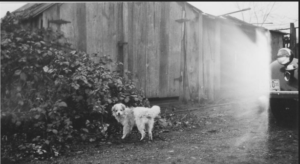 WASHINGTON, D.C.—A DNA sample has been extracted from the pelt of a Pacific Northwest Coast Salish woolly dog named Mutton, who had been adopted, perhaps from a Coast Salish community near the town of Chilliwack, British Columbia, by a naturalist and ethnographer working for the U.S. government, according to a Washington Post report. When Mutton died in 1859, his pelt was preserved at the Smithsonian Institution. Although the breed as a whole also disappeared in the nineteenth century, traditional knowledge of Coast Salish people indicates that the fluffy white dogs were raised by women, who fed them a special diet of fish or elk, kept them apart from other dogs, and then used their wool to make blankets and other textiles. Analysis of Mutton’s DNA sample suggests that woolly dogs split from other North American dogs between 1,900 and 4,800 years ago. Only 16 percent of Mutton’s ancestry came from European dogs, while the rest of his ancestry came from precolonial Indigenous dogs, confirming that woolly dogs had been isolated from European dogs shortly before they disappeared. “They were told they couldn’t do their cultural things,” said Rena Point Bolton, an elder from the Stó:lō Nation. “There was the police, the Indian agent, and the priests. The dogs were not allowed,” she explained
WASHINGTON, D.C.—A DNA sample has been extracted from the pelt of a Pacific Northwest Coast Salish woolly dog named Mutton, who had been adopted, perhaps from a Coast Salish community near the town of Chilliwack, British Columbia, by a naturalist and ethnographer working for the U.S. government, according to a Washington Post report. When Mutton died in 1859, his pelt was preserved at the Smithsonian Institution. Although the breed as a whole also disappeared in the nineteenth century, traditional knowledge of Coast Salish people indicates that the fluffy white dogs were raised by women, who fed them a special diet of fish or elk, kept them apart from other dogs, and then used their wool to make blankets and other textiles. Analysis of Mutton’s DNA sample suggests that woolly dogs split from other North American dogs between 1,900 and 4,800 years ago. Only 16 percent of Mutton’s ancestry came from European dogs, while the rest of his ancestry came from precolonial Indigenous dogs, confirming that woolly dogs had been isolated from European dogs shortly before they disappeared. “They were told they couldn’t do their cultural things,” said Rena Point Bolton, an elder from the Stó:lō Nation. “There was the police, the Indian agent, and the priests. The dogs were not allowed,” she explained















